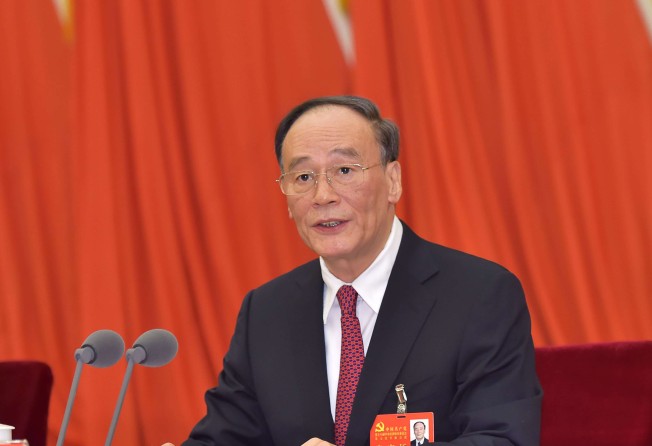Pilot scheme seen as bid to strengthen China’s anti-graft tsar
Launch of new corruption-fighting agency will ultimately increase the power of Wang Qishan, analysts say

The overhaul of the state supervision system on the mainland, which has been kicked-started with a pilot scheme, is likely to give more power to the Communist Party’s top anti-graft body and pave the way for its chief,Wang Qishan, to stay in power for another term, analysts said.
The reform, to be first tried out in Beijing and Shanxi and Zhejiang provinces, was meant to beef up state supervision of all public servants via a new anti-corruption body – the state supervision commission – Xinhua reported yesterday.
The scheme will later be implemented nationwide. The ultimate goal is to build a state anti-corruption organ under the Communist Party’s leadership that will integrate separate government anti-graft forces and cover all public servants.
Analysts said the introduction of the new state supervision commission, which will share an office and personnel with the Central Commission for Discipline Inspection (CCDI), which Wang heads, would be under the de facto control of the CCDI and further expand its power.
Wang, a key ally of President Xi Jinping, will be 69 when a leadership reshuffle takes place next year.
Speculation that Xi will bend the party’s unwritten retirement rule and keep his right-hand man in the Politburo Standing Committee has been gaining steam, especially after a senior party researcher dismissed the rule as “folklore” last week.
Following the launch of the pilot scheme, Wang published an article in People’s Daily yesterday that called on all 80 million party members to toe the line.
“Absolute power leads to absolute corruption, and thus unsupervised power is extremely dangerous,” Wang wrote.
As the party’s discipline watchdog, the CCDI can in theory only supervise its members, but pundits said the new commission would allow it to watch over all public servants, even if they were not in the party.
Chen Daoyin, a political scientist at the Shanghai University of Political Science and Law, said the supervision of the CCDI could be extended “through the state supervision commission, without acting in its own capacity”.
He said Wang was likely to take up an important role in the state supervision commission, as its director or party chief.
“Xi needs someone who he can fully trust and who has the authority within the party to drive the reform [involving the state supervision system],” Chen said.
“Wang is the best choice for the role with the authority he built up over the past four years by spearheading the anti-corruption campaign.”
The campaign led by Wang has thrown behind bars scores of senior officials, including political rivals of Xi like ex-security tsar Zhou Yongkang.
“I think it is almost certain that Wang will stay in power for another term,” Chen added.
Zhang Lifan, a political analyst in Beijing, said that by increasing the power of his key ally, Xi could further cement his authority as the “core” leader – a status he was officially granted by the party’s Central Committee last month.